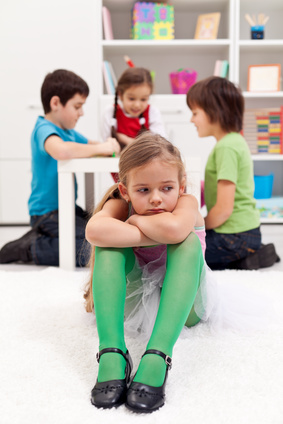Friends are vital for a child’s healthy development. In this blog you will discover what your child
needs to know to develop friendships, and how to be a good friend.

Imagine for a moment that your child is at school. She is sitting off to the side watching her peers play a game. She wants to play, but doesn’t know how to approach the other kids. She has no idea of what to say, what to do or how to join in. She’s also scared of rejection.
Fear of rejection is one of human’s greatest fears, third only to the fear of public speaking and the fear of death.
At any age, we all need connections with people to make our life meaningful.
Children aren’t born with social skills, so as a parent it’s our responsibility to show our kids how to interact successfully with their peers.
This begins with love, respect and acceptance in the parent/child relationship from an early age. By being a good role model, this will prepare your child to go out into the world with the trust and self-confidence to meet others.
Children learn by watching how we interact with others. How we meet people, talk with them, laugh, tell jokes, and ask questions. Whether we win, lose, apologise or accept an apology well, our children will learn how we treat other people, and if we have patience, respect and consideration for others.
If children learn these lessons before they go to school, it will be easier to make friends when they get there. As usual, some people make friends more easily than others due to their more outgoing personalities.
We don’t need to turn everyone we meet into a close friend, though it’s important to show people who we are. And to learn who they are in return and, through our actions – show we care about them.
Being a parent is a big responsibility. Teaching our children how to make friends and create lasting friendships is another aspect of our ‘job’.
There are other ways to help your child develop friendships.
You can provide opportunities by having other children over for play-dates and by letting your child join various sporting groups or clubs. There, they will gain a basic understanding of how games are played, the rules of the game, and how to develop sportsperson-like behaviour. Often, clubs feature “Have a Go” days. These allow your child to try a sport and see which one they are most comfortable playing, before they decide to join a team.
Below are some suggestions on how your child can make friends. A good time to do this is when you have some spare time, then you and your child can have a discussion about some of the points listed here.
HOW TO MAKE FRIENDS
The suggestions below have been compiled from research and you might have others you could add to the list. Friendship has different meanings for everyone.
My personal opinion of a good friend is someone who is there when I need them; someone who will listen to me and not tell anyone what we’ve discussed. A good friend is a shoulder to cry on, a hug when needed, an invitation for a coffee and a chat, or just being at the end of the phone when I need someone to ‘vent’ to; not to ‘fix me,’ just to listen; or offer advice if I ask for it.
Firstly, it’s important to ask your child what THEY think makes a good friend then, by going through the list below with them, and discussing the items, you’ll be planting seeds for their future:
- It takes time to know people and sometimes it’s easier to focus on one person at a time.
- When you want to speak to someone – be friendly, smile, look them in the eyes and tell them your name. Ask them their name, too.
- You could ask someone what games they like to play. Or find out if you have anything in common. You might find you have a common interest and you both enjoy doing the same things.
- If they respond, and it’s something you can play together, ask them if they would like to play with you.
- You might like to take a ball or small toy (not valuable) to school and ask a classmate to join you in a game.
- A simple way to create conversation is to look at them and compliment them on something about them e.g. I like the way you do your hair, or make a positive comment on what they are wearing.
- Another option is, if they have a possession which you like, to compliment them on that.
- Taking turns to talk is important. Listen to what the other person says and let them finish before saying what you want to say.
- Smile and laugh at the right times, when and where it’s appropriate.
- At school, find out if someone you like has special pets. Ask them questions about their pet. Talk about any pets you may have. Listen when they are talking to you and take turns talking.
- If you see a group of children and they are doing something you want to do, ask them if there is room for one more to play.
- Don’t laugh at the expense of someone else, such as if they drop a ball or fall over.
- Place yourself in the shoes, or position of someone else. You would probably be sad if someone laughed at you, so don’t do the same to someone else.
- If someone looks like they need help, ask if you can help them.
- If someone is being verbally attacked, stand with them and be supportive so they don’t feel alone. Take their arm and walk away, then get help from an adult if you feel you need it.
- If they are hurt, find an adult who can help. Stay with them if they need the company of someone their own age.
- If someone looks sad, or is crying, ask if you can help them. If not, sit beside them until they seem to be feeling better.
HOW TO KEEP FRIENDS
There are certain character traits, or essential qualities that make them a good friend. Some of these qualities are: loyalty, trust and kindness.
Once your child has a friend, or friends, it’s important they care about them and treat them well so they will want to remain a friend.
There are various things that are important in a relationship, regardless of how young or old you are.
Here are some ways to nurture existing relationships:
- Be truthful, though in a kind way – you know the old adage, ‘If you can’t say something nice about someone, say nothing at all’?
- Show happiness when you see your friend.
- Accept your friends for who they are, not what they can give you or who they know.
- Take turns doing things that each other likes to do – it’s not always about you.
- Try to work out differences in a normal voice, not an angry one.
- It’s not the number of friends you have; it’s the quality of those friends that is important.
- Accept that your friends might be different from who you are, and that’s OK. If we were all the same, the world would be a dull place.
- Stand up for your friend if someone is being mean.
- Tell your friend if you are feeling sad, angry or just need time to yourself. Sometimes, talking about your feelings can help clear them instead of keeping them bottled up inside.
- When you’re happy, it’s great to share your happiness with others by expressing how you feel.
- Put yourself in your friend’s shoes if you find they have become upset by something you’ve said.
- Always apologise if you’ve made a mistake or said something that wasn’t right.
- Be genuinely happy if your friend receives something they deserve, or even if it’s something that you wanted for yourself.
- Never reveal secrets without your friend’s permission.
In certain circumstances it is OK to tell a parent or teacher if you are worried that your friend might hurt themselves or someone else.
Information taken from Chapter 8 ‘Making Friends’ in the Bully Proof Your Child Workbook.
For more information about the book and program, please register to watch the presentation at www.bullyproofed.com.au

